|
|
|
Sort Order |
|
|
|
Items / Page
|
|
|
|
|
|
|
| Srl | Item |
| 1 |
ID:
107203
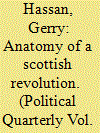

|
|
|
|
|
| Publication |
2011.
|
| Summary/Abstract |
Scottish politics isn't about some remote northern politics but go to the heart of the nature, character and power dimensions of the UK and British state. Scotland has been dramatically changed by the scale of the SNP landslide victory in the 2011 Scottish Parliament elections. Scottish society, identity and culture along with the politics of unionism and nationalism have all changed and will change further. The old fashioned politics of devolution are dead, but what comes next and what are the consequences for Scottish independence? What has to be challenged are old-fashioned out-of-date views of the SNP, and the unreconstructed nationalism of the British state.
|
|
|
|
|
|
|
|
|
|
|
|
|
|
|
|
| 2 |
ID:
107205
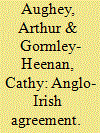

|
|
|
|
|
| Publication |
2011.
|
| Summary/Abstract |
This article examines the surprisingly muted commemoration of the 25th anniversary of the Anglo-Irish Agreement. It was surprising because not only was the Agreement a major innovation in relations between the two states but it was also the defining political issue in Northern Ireland for almost a decade. It is argued that the significance of the Agreement has been diminished because of retrospective narratives which serve the political convenience of the key parties to the Northern Ireland conflict. The article adapts Oakeshott's notion of the 'dry wall' to re-assess and to re-state the Agreement's place in recent history.
|
|
|
|
|
|
|
|
|
|
|
|
|
|
|
|
| 3 |
ID:
107204


|
|
|
|
|
| Publication |
2011.
|
| Summary/Abstract |
Despite increasing support for participatory and deliberative principles amongst academics, practitioners and parliamentarians alike, efforts to infuse political systems with more inclusive and consensual forms of debate often founder. This article explores this conundrum by examining institutional reforms through the lens of deliberative democracy. More specifically, we scrutinise attempts to institutionalise forms of civic deliberation within the Scottish political system via the Scottish Civic Forum and the Scottish Parliament's committee system. Our analysis tells the story of how these two types of institutional reform, both designed to facilitate the move towards a more participatory and deliberative model of democracy in Scotland, have fared over a ten-year period. In turn, this analysis allows us to comment on the ways in which deliberative and parliamentary democracy may be integrated.
|
|
|
|
|
|
|
|
|
|
|
|
|
|
|
|
| 4 |
ID:
107208
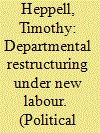

|
|
|
|
|
| Publication |
2011.
|
| Summary/Abstract |
Despite their emphasis on joined up government, which was to be one of the defining features of the New Labour governing project, attempts to enhance policy delivery would also result in major departmental restructuring within each of their three terms in office. This article asks three questions with regard to the New Labour and departmental restructuring. First, from a historical comparative perspective was there a greater degree of departmental restructuring under New Labour than under previous governments? Second, in the case of New Labour what was the motivation for departmental restructuring? Finally, was New Labour characterised by successful departmental restructurings? Utilising select committee material for the views of civil servants and combining this with questionnaire feedback from former New Labour ministers this article seeks to address these questions to assess the record of departmental restructuring in the New Labour era.
|
|
|
|
|
|
|
|
|
|
|
|
|
|
|
|
| 5 |
ID:
107207


|
|
|
|
|
| Publication |
2011.
|
| Summary/Abstract |
This article considers possible future directions for education policy and public service governance under the Conservative-led coalition government. The article considers the extent to which Conservatives might develop a distinctive strategy for managing public services that breaks decisively with that of the New Labour era. The coalition faces a markedly different political and economic context for public service reform compared to its predecessor. This article argues that these contextual constraints make a continuation of the New Labour governing strategy less viable, but unresolved tensions in the coalition education policies enacted to date may hinder the development of a novel project for education reform. As a consequence, the New Labour education project seems likely to remain largely intact for the foreseeable future.
|
|
|
|
|
|
|
|
|
|
|
|
|
|
|
|
| 6 |
ID:
107212
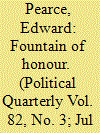

|
|
|
|
|
| Publication |
2011.
|
| Summary/Abstract |
Pearce argues that honours do not deserve the earnest linguistic toil of the virtuous PAC. Starting with the peers, he observes that when William the Conqueror/Bastard distributed land stolen with violence to his armed band, it was the simple loot from which ancient chivalry, honour and nobility flows. Such lords developed under the more civilised early Whigs, like Walpole, into rent for sending steady support from owned boroughs into the Commons. Witness Bubb Dodington and his three and a half seats in Weymouth, made a Viscount in the name of one of its suburbs.
Harold Macmillan would sack a minister with the wheedling consolation 'A Little something to wear under your tie'. By inventing the Life Peerage, he helped the slow subversion of elected government by creating unelected, often powerful ministers with no relationship to country or people, candid nominees of the National Leader. The one virtue of the post-Macmillan upper house lies in the disloyal, which is say minimally or not all party-attached people of talent reliably voting against ministerial requirements. As for the insignia of all honours, their bars, discs and ribbons are kept on cards in Palace drawers like so much paste jewellery.
|
|
|
|
|
|
|
|
|
|
|
|
|
|
|
|
| 7 |
ID:
107206


|
|
|
|
|
| Publication |
2011.
|
| Summary/Abstract |
The May 2010 general election represented a change in tone on immigration and asylum policy for the Conservative party. Although its manifesto still contained a promise to limit numbers and expressed concern about the abuse of student visas, the Party's previous fixation with asylum seekers had disappeared. This article considers the rationale for these developments in the light of David Cameron's election as leader in late 2005 and his efforts from then on to reposition his party. Cameron's initial silence on this issue and his appointment of a moderate as immigration spokesman were part of an attempt both to shift the focus onto the economic impact of migration and, more broadly, to 'decontaminate the Tory brand' in order to gain 'permission to be heard' by small-l liberals who were critical to the Party's electoral recovery but alienated by hard-line stances. That said, immigration was never entirely forgotten even in this early period and was always seen, so long as it was carefully handled, as an issue capable of benefitting the Tories. As such, it was skilfully factored back into the Party's offer from late 2007 onwards. In government, the Conservatives may have the upper hand on immigration over their junior coalition partner, but this is no guarantee that they will be able to deliver the outcomes they promised
|
|
|
|
|
|
|
|
|
|
|
|
|
|
|
|
| 8 |
ID:
107199
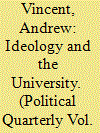

|
|
|
|
|
| Publication |
2011.
|
| Summary/Abstract |
Ideology underpins recent transformations of British universities; it forms an unquestioned backdrop to policy-making. The ideology at issue is a market-based neo-liberalism-accompanied by a doctrinaire private-sector managerialism. Universities employing this ideology envision it as common sense. The ideology is thus not proselytised, but rather structures the vernacular of university speech. In reality it is a highly politicised ideology masquerading as a managerial reality. Its effect on universities has been profoundly destructive. The dignified public good of higher education has now become a huckstering marketised mechanism. What is so perplexing is the quiescence of universities. The ideology is so hegemonic that it appears exempt from criticism. University administrators are now quite unapologetic ideological functionaries and we need to relearn how to criticise those who manage us. Ultimately no ideology lasts, this present one will be supplanted, the question is what level of damage to civil and intellectual life will it inflict?
|
|
|
|
|
|
|
|
|
|
|
|
|
|
|
|
| 9 |
ID:
107209


|
|
|
|
|
| Publication |
2011.
|
| Summary/Abstract |
It is well known that the President of the United States is elected by the Electoral College and not directly by the population. Every time a candidate who does not win the most popular votes is elected President, detractors of the Electoral College call for its abolishment and supporters extol its undoubtedly merits. This article investigates what would have happened if a solution halfway between both extremes (a direct national election and the current system) had been used in historical Presidential elections; namely, a proportional rule with thresholds to assign electors in each state. This system would generate electoral colleges closer to popular will, reduce the risk of electing a minority president and impose the need of more balanced regional support to be elected, although increasing the risk of a third candidate emerging.
|
|
|
|
|
|
|
|
|
|
|
|
|
|
|
|
| 10 |
ID:
107210
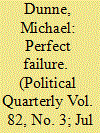

|
|
|
|
|
| Publication |
2011.
|
| Summary/Abstract |
In 1961 the US Central Intelligence Agency master-minded a sea-borne invasion by Cuban exiles aimed at overthrowing the regime headed by Fidel Castro. With minimal logistical support from the USA the attempted counter-coup launched at the Bay of Pigs was an unqualified disaster: a 'perfect failure', in the words of an authoritative contemporary. This essay locates the fiasco in the longer history of US-Cuban relations, concentrating on the Cold War years, the history of US political intervention and subversion in Latin America, and the dictatorship of Fulgencio Batista and the rise of Castro himself-both men offering different models of Latin American caudillismo (the power and cult of military strongmen). The essay concludes with an analysis of Cuba as an issue in US domestic politics and the impact of the Bay of Pigs in consolidating the Cuban revolution and setting the framework for the Cuban Missile Crisis of October 1962.
|
|
|
|
|
|
|
|
|
|
|
|
|
|
|
|
| 11 |
ID:
107211
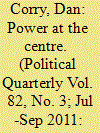

|
|
|
|
|
| Publication |
2011.
|
| Summary/Abstract |
The centre of power in the UK lies in No 10 Downing Street and is surprisingly weak in terms of numbers. This article, written by a former insider, looks at how power is exercised in a variety of ways, some formal, through cabinet and its committees some informal, through the force of personality of the Prime Minister and his team especially his policy unit. It goes on to examine the creation and functioning of the National Economic Council, set up by Gordon Brown in response to the financial and economic crisis of 2007-8. It argues that this was a successful innovation towards a more structured approach that delivered faster policy formation and delivery and created a sense of unity. While it is probably a model that works best in crisis moments, it could be taken forward in other ways.
|
|
|
|
|
|
|
|
|
|
|
|
|
|
|
|
| 12 |
ID:
107200


|
|
|
|
|
| Publication |
2011.
|
| Summary/Abstract |
Britain's constitution has changed dramatically over the past forty years in which the author has been involved in national politics: devolution, the supremacy of EU law, the greater willingness of the judiciary to intervene in political issues and new human rights legislation. However these changes have been essentially random, argues David Lipsey, lacking any binding theme. These changes continue under the new coalition government. However the even greater changes to British politics have essentially a single source: the dramatic change in social class in Britain and its impact on electoral politics-for example the rise of the media and the decline of ideology
|
|
|
|
|
|
|
|
|
|
|
|
|
|
|
|
| 13 |
ID:
107201
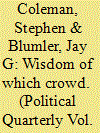

|
|
|
|
|
| Publication |
2011.
|
| Summary/Abstract |
his article considers the claims made by members of the current UK Coalition government to adopt a new style of listening, consultative politics based upon the so-called wisdom of the crowd. It considers how these claims have-and could have-been acted upon, focusing upon two central policy proposals; the funding of higher education and the reform of the National Health Service.
|
|
|
|
|
|
|
|
|
|
|
|
|
|
|
|
|
|
|
|
|